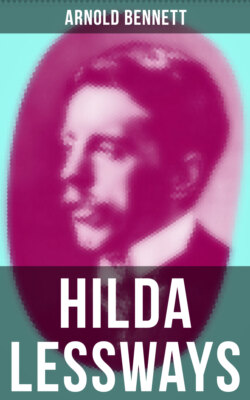Читать книгу HILDA LESSWAYS - Arnold Bennett - Страница 11
На сайте Литреса книга снята с продажи.
iii
ОглавлениеDespite all Hilda’s terrible wisdom and sagacity, this remark of the foolish mother’s was the truest word spoken in the discussion. It was Hilda’s tone that was at the root of the evil. If Hilda, with the intelligence as to which she was secretly so complacent, did not amicably rule her mother, the unavoidable inference was that she was either a clumsy or a wicked girl, or both. She indeed felt dimly that she was a little of both. But she did not mind. Sitting there in the small, familiar room, close to the sewing-machine, the steel fender, the tarnished chandelier, and all the other daily objects which she at once detested and loved, sitting close to her silly mother who angered her, and yet in whom she recognized a quality that was mysteriously precious and admirable, staring through the small window at the brown, tattered garden-plot where blackened rhododendrons were swaying in the October blast, she wilfully bathed herself in grim gloom and in an affectation of despair.
Somehow she enjoyed the experience. She had only to tighten her lips—and she became oblivious of her clumsiness and her cruelty, savouring with pleasure the pain of the situation, clasping it to her! Now and then a thought of Mr. Skellorn’s tragedy shot through her brain, and the tenderness of pity welled up from somewhere within her and mingled exquisitely with her dark melancholy. And she found delight in reading her poor mother like an open book, as she supposed. And all the while her mother was dreaming upon the first year of Hilda’s life, before she had discovered that her husband’s health was as unstable as his character, and comparing the reality of the present with her early illusions. But the clever girl was not clever enough to read just that page.
“We ought to be everything to each other,” said Mrs. Lessways, pursuing her reflections aloud.
Hilda hated sentimentalism. She could not stand such talk.
“And you know,” said Hilda, speaking very frigidly and with even more than her usual incisive clearness of articulation, “it’s not your property. It’s only yours for life. It’s my property.”
The mother’s mood changed in a moment.
“How do you know? You’ve never seen your father’s will.” She spoke in harsh challenge.
“No; because you’ve never let me see it.”
“You ought to have more confidence in your mother. Your father had. And I’m trustee and executor.” Mrs. Lessways was exceedingly jealous of her legal position, whose importance she never forgot nor would consent to minimize.
“That’s all very well, for you,” said Hilda; “but if the property isn’t managed right, I may find myself slaving when I’m your age, mother. And whose fault will it be?... However, I shall—”
“You will what?”
“Nothing.”
“I suppose her ladyship will be consulting her own lawyer next!” said Mrs. Lessways bitterly.
They looked at each other. Hilda’s face flushed to a sombre red. Mrs. Lessways brusquely left the room. Then Hilda could hear her rattling fussily at the kitchen range. After a few minutes Hilda followed her to the kitchen, which was now nearly in darkness. The figure of Mrs. Lessways, still doing nothing whatever with great vigour at the range, was dimly visible. Hilda approached her, and awkwardly touched her shoulder.
“Mother!” she demanded sharply; and she was astonished by her awkwardness and her sharpness.
“Is that you?” her mother asked, in a queer, foolish tone.
They kissed. Such a candid peacemaking had never occurred between them before. Mrs. Lessways, as simple in forgiveness as in wrath, did not disguise her pleasure in the remarkable fact that it was Hilda who had made the overture. Hilda thought: “How strange I am! What is coming over me?” She glanced at the range, in which was a pale gleam of red, and that gleam, in the heavy twilight, seemed to her to be inexpressibly, enchantingly mournful. And she herself was mournful about the future— very mournful. She saw no hope. Yet her sadness was beautiful to her. And she was proud.
